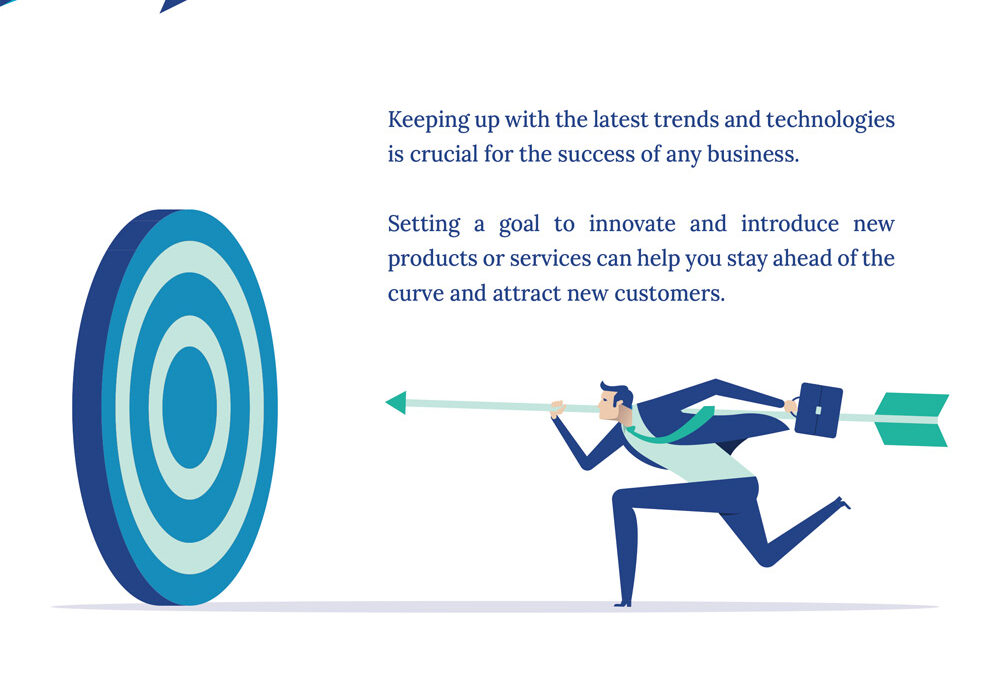SMART goals are a great way for entrepreneurs to establish milestones for their business and to measure success. SMART is an acronym that stands for specific (S), measurable (M), attainable (A), relevant (R), and time-bound (T). SMART goals can help entrepreneurs ensure they are working toward targets that will help them achieve and craft the vision for their business.
Many business owners set basic goals like achieving $100,000 in revenue by the end of the fiscal year, launching a new product or service within the next quarter, or maybe even reducing expenses by 10% within the next six months. While there’s nothing wrong with goals like these, forward-thinking entrepreneurs might want to consider setting more in-depth SMART goals that require them to think outside of the box and stay ahead of their competition. We’ve compiled a list of seven ideas to jumpstart your own brainstorming.

- Employee Retention
Keeping employees happy and motivated is essential for the success of a business. Setting a SMART goal to improve employee retention rates can help you in both the long and short term by attracting and retaining top talent, improving productivity, and reducing recruitment costs. - Sustainability
As more and more consumers become conscious of the impact their purchases have on the environment, setting a goal to become a more sustainable business can give you a competitive edge. You could do this by reducing waste, using eco-friendly materials, or implementing recycling programs into your workflows. - Diversification
Businesses that offer a single product or service are always more at risk. Diversifying your products or services can help you expand your customer base and reduce your reliance on a single source of revenue. Why not set a goal to diversify your offerings to help you stay ahead of the competition and increase your resilience to market changes? - Innovation
Keeping up with the latest trends and technological advances is crucial for the success of any business. You could start by setting a goal to do a deep-dive assessment of where your business could be lagging or behind in technology or processes. If you need an example of why this is important, look no further than the recent debacle with Southwest Airlines. - Community Impact
As a business owner, you have the power to make a positive impact on your community. Think about setting a goal to give back by volunteering, supporting a local charity, or starting a community program. In the process, you’ll build a positive reputation and strengthen your relationship with your potential customers and neighbors. - Personal Development
As an entrepreneur, it’s important to continuously develop your skills and knowledge. Think about setting a goal to attend a workshop, take a course, or read a certain number of books that can help you stay up to date with the latest industry trends and improve your ability to lead your business. These are the types of resources and opportunities that will help in your future SMART goal setting, too! - Employee Development
Don’t stop with yourself, though. Investing in the development of your employees can not only improve their job satisfaction, but also increase their productivity and skills. Set a goal to provide training and development opportunities for your employees and watch your business transform.
SMART goals help entrepreneurs stay focused on what is important and ensure they are working toward targets that will help their business grow and succeed. Be sure to set a deadline for each goal and make a plan for how to achieve it. It’s also important to remember that setting SMART goals is not a one-time event. Regularly evaluating progress and adjusting the goal as necessary will help ensure that each one remains relevant and attainable.
It’s also important to note that not every goal needs to be measurable in terms of numbers and figures. Some goals, such as community impact, may be more difficult to quantify but can still be set as SMART goals by being specific, attainable, relevant, and time-bound.
For example, increasing community impact by supporting a local charity. This goal is specific, as it targets a specific charity or community organization. It is attainable, as the entrepreneur can take steps such as volunteering, organizing a fundraising event, or making a donation to the charity. It is relevant, as supporting a local charity can help build a positive reputation for the business and strengthen relationships with the community. And it is time-bound, as the entrepreneur can set a deadline for when they want to make the donation or organize the event. But actually measuring the direct financial impact the support makes for your business may be years in the making, or even impossible.
If you are an entrepreneur, take some time this month to think outside of the box and set SMART goals for your business this year that can help you stay ahead of the competition, make a positive impact in your community, and continuously improve your business. Remember, SMART goals can be an essential part of entrepreneurship and success.
Looking for more ideas to transform your business? Tremonte can help. Check out our podcast Traversing Entrepreneurship to hear real life stories from other entrepreneurs just like you.


